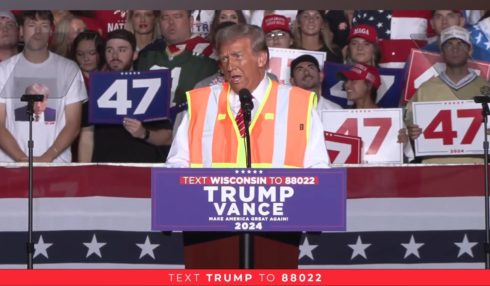In a striking move, Donald Trump made an appearance at a Wisconsin rally dressed in a high-visibility garbage collector uniform, taking a jab at President Joe Biden’s alleged remark calling his supporters “garbage.” Trump’s team said his attire was a symbolic response to Biden’s words, though Biden denied any negative intention, stating he aimed to criticize a comedian’s remarks at a previous Trump rally rather than Trump’s supporters. The gesture underscores Trump’s willingness to directly challenge the Biden-Harris administration’s messaging as Election Day approaches.
Trump’s rally, introduced by NFL icon Brett Favre, featured Trump emphasizing his dedication to the “forgotten American” and playing to his base’s grievances against the current administration. “250 million Americans are not garbage,” Trump declared, galvanizing his supporters. In addition to his symbolic attire, he rode into the rally atop a garbage truck, further dramatizing his statement and leaving an impression on attendees about his self-proclaimed commitment to the people he feels are neglected by Washington elites.
Kamala Harris Focuses on Cost of Living and Youth Voters
Meanwhile, Vice President Kamala Harris held a competing rally in Wisconsin, appealing to young voters and prioritizing issues directly impacting American households. Harris delivered a rousing message on the rising cost of living, promising that her administration would focus on making life more affordable. “Your vote is your voice,” she told the crowd, encouraging youth participation and framing the upcoming election as a battle for future freedoms.
Harris outlined her plans to address child care costs, healthcare, and small business tax cuts, linking these proposals to the broader fight for economic justice. With her platform aimed at economic relief, reproductive rights, and health equity, Harris also highlighted the Biden administration’s commitment to safeguarding democracy, positioning herself as a steady alternative to Trump. Her rally was interrupted by protestors criticizing U.S. support for Israel, but she remained steadfast, refocusing on her policy goals and aspirations for America’s youth.
Economic Sentiment and the Election Impact
Recent U.S. economic data shows a 2.8% annual growth rate, driven by consumer spending. However, this positive news hasn’t lifted the general mood in the country, where opinions on the economy are divided along partisan lines. While 61% of Democrats view the economy positively, only 13% of Republicans share this optimism. For many, a 21% rise in living costs over the past four years has cast a shadow on economic growth statistics, leaving voters skeptical about the administration’s handling of inflation and costs.
This economic divide has fueled debate on which candidate could better address job growth and grocery prices. Marjorie Connelly, a senior fellow at the AP-NORC Center for Public Affairs, suggests that while the economy remains a key voter concern, partisan loyalties will ultimately drive voting decisions. This sentiment is mirrored in Wisconsin, where Trump supporters are highly confident despite fears of election interference, adding another layer of complexity to voter turnout predictions.
Swing State Tensions and Fears of “Cheating by Trump Supporters
Trump’s supporters in swing states like Wisconsin express both confidence and deep-seated fears of election fraud, similar to sentiments seen in the 2020 election. In Green Bay, residents like Brad Miller voiced concern about potential irregularities, citing worries over non-citizens voting or ballots not being counted accurately. These claims, often unsubstantiated, echo Trump’s own repeated accusations and continue to resonate among his base.
Despite multiple investigations finding no evidence of large-scale fraud in previous elections, fears of “cheating” linger, driven in part by Trump’s rhetoric. This concern among Trump voters reflects the lasting impact of misinformation on public trust in the electoral system, which could affect voter engagement and the integrity of Election Day itself. In response, Democrats like Harris are attempting to counter these narratives by emphasizing the legitimacy of the electoral process and the importance of casting every vote.














